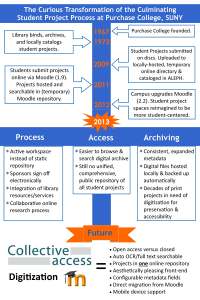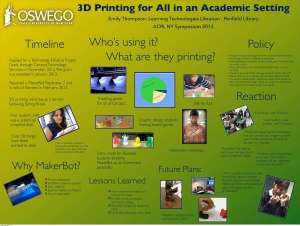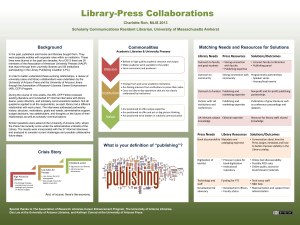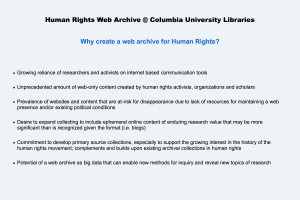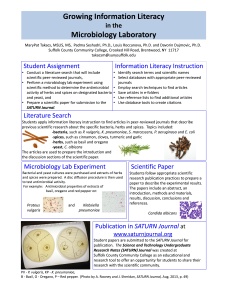The following posters have been selected for the 2013 ACRL/NY Symposium. The committee received a record 57 excellent applications this year, and we thank everyone who submitted a proposal.
The Curious Transformation of the Culminating Student Project Process at Purchase College, SUNY
3D Printing for All in an Academic Setting
Off the Shelf! Making Space for Student Learning
Library-Press Collaborations
Assessment of the Effectiveness of the Human Rights Web Archive @ Columbia University
Growing Information Literacy in the Microbiology Laboratory
Rhizomatic Growth: Peer Learning with BambooDiRT at Barnard Library
The Curious Transformation of the Culminating Student Project Process at Purchase College, SUNY
Marie Sciangula, Darcy Gervasio, Kim Detterbeck
State University of New York at Purchase
**Based on some conversations with those who stopped by our poster, the Moodle Student Project workspace that we demonstrated to participants is now available to anyone who logs in as a guest at our Moodle instance at the following URL: http://tinyurl.com/PurchaseSampleStudProj (just click the “Login as guest” button at the Moodle login page).
This poster will illustrate how the Library and Teaching, Learning, and Technology Center (TLTC) came together to transform the yearlong Student Projects process (i.e. senior projects, masters theses, and capstone papers). We will show how we adapted technologies already in place (Moodle and LibGuides) to enhance and streamline the process of researching, developing, submitting, and archiving students’ culminating educational experience. We will show how librarians, catalogers, developers, and TLTC staff partnered to create a workspace that has taken Student Projects from a traditional paper-based process to a digital, dynamic, student-centered venture that are interwoven with reference, instruction, assessment, and access. The poster will include a timeline depicting major milestones in retooling the Student Project process. We will have an iPad to show the digital workspaces in Moodle. This poster could serve as a model for campuses using an open source LMS to replicate.
3D printing for all in an academic setting
Emily Thompson
State University of New York at Oswego
SUNY Oswego implemented MakerBot 3D printing in March 2012, and we are pleased to be one of the first non-engineering academic libraries providing this service. This poster explores how we did it, our policies, and the practicalities of offering 3D printing to the general population.
.
.
Off the Shelf! Making Space for Student Learning
Mary Gilbert, Mary Ranadive
Towson University
Making space for collaboration and creative activities has moved to the forefront in library space planning. During this process not much thought has been given to the print collection in terms of maximizing its usefulness. How do you build a supportive print collection focused on the needs of users, while at the same time making space to support collaboration, creativity and scholarly pursuits? To answer this question, our library, which is part of a large public university, formed a task group with the broad charge of ‘collection enhancement’. This poster describes our plans, methods, successes and challenges in this endeavor. How can you make the collection more inviting? How do you best prepare the librarians for reducing the print collection in order to create people space while at the same time enhancing the existing print collection? What are some of the best practices in this area? Follow us on this poster as we address library space and collection challenges.
Library-Press Collaborations
Charlotte Roh
University of Massachusetts Amherst
In order to better understand the new evolving relationships between university presses and academic libraries, a review of press and library collaborations was undertaken by the University of Arizona (UA) Press and the UA Libraries through the Association of Research Libraries Career Enhancement Program (ARL CEP). The ARL CEP Fellow reviewed existing literature, interviewed staff at the University of Arizona, and conducted 27 informal interviews with library deans, press directors, and scholarly communications leaders. The interviews addressed the partnership history, structure, motivations, goals and needs, administrative support and budget decisions, key stakeholders, and thoughts on the future of their relationships as well as scholarly communications. The study explored UA perceptions of the library and press, and asked the staff to consider current challenges and future steps. The final report reviews trends and makes recommendations for collaboration and healthy relationships.
Assessment of the Effectiveness of the Human Rights Web Archive @ Columbia University
Anna Perricci, Pamela Graham
Columbia University
http://hrwa.cul.columbia.edu/
Web archiving encompasses several challenges that we face in the midst of the radical changes that are the focus of the ACRL-NY 2013 Symposium. Like many other interdisciplinary, wide-ranging and highly networked fields, human rights scholarship relies extensively on web-based information, but much of this content is at risk of disappearing within a relatively short time.
To meet the needs of the scholarly community, the Human Rights Web Archive @ Columbia University (HRWA) was created. The HRWA is a searchable collection of archived copies of human rights websites created by non-governmental organizations, national human rights institutions, tribunals and individuals.
In this poster we will detail our early progress in the assessment of the effectiveness of the HRWA through user testing and a review of scholarly publishing in journals focusing on human rights research. We will also discuss how keeping users actively engaged is at the core of our evolving collecting policy for web archives. In sharing our experiences with a collection development policy centered in an active and agile feedback loop, we hope to shed light on strengths and opportunities for growth including via collaborative initiatives.
Growing Information Literacy in the Microbiology Laboratory
MaryPat Takacs
Suffolk County Community College
The poster addresses the collaboration among the science librarian, a microbiology faculty member and the editors of the open access journal, SATURN, to connect library research, laboratory research and science writing. The SATURN (Science and Technology Undergraduate Research Notes) Journal was created in 2012 as an educational tool and a vehicle to share undergraduate research online (http://www.saturnjournal.org/). The journal presented an opportunity for the science librarian to collaborate with a microbiology faculty member to teach science students information literacy skills that could be directly applied to scientific research papers. The information literacy instruction focused on search strategies to find peer-reviewed journal articles. The microbiology assignment required students to apply the scientific method to explore the antimicrobial activity of herbs and spices. And finally, the SATURN Journal offered students an opportunity to share new scientific information.
Rhizomatic Growth: Peer Learning with BambooDiRT at Barnard Library
Vani Natarajan, Heather Lember
Barnard College
What happens when we turn a library computer lab into an adventurous test space for digital pedagogy? A group of Barnard Library and Academic Information Services staff participated in a peer education initiative last summer, in an attempt to find answers to this and other questions. In weekly workshops, staff guided each other through digital tools featured in the Bamboo DiRT repository. The Bamboo DiRT workshops functioned not only as spaces to learn about digital tools, but to learn about pedagogy itself. Rather than fetishize tools, we engaged critically. Teams developed rich learning materials, like a map on the geography of James Baldwin’s fiction. Participants will be writing tool reviews to help developers devise “recipes” grouping tools in thematic workflows. From this project, a larger community of digital humanists may glean a lively, multimodal understanding of the roles and possibilities of digital research tools in libraries, archives, classrooms, and beyond.

